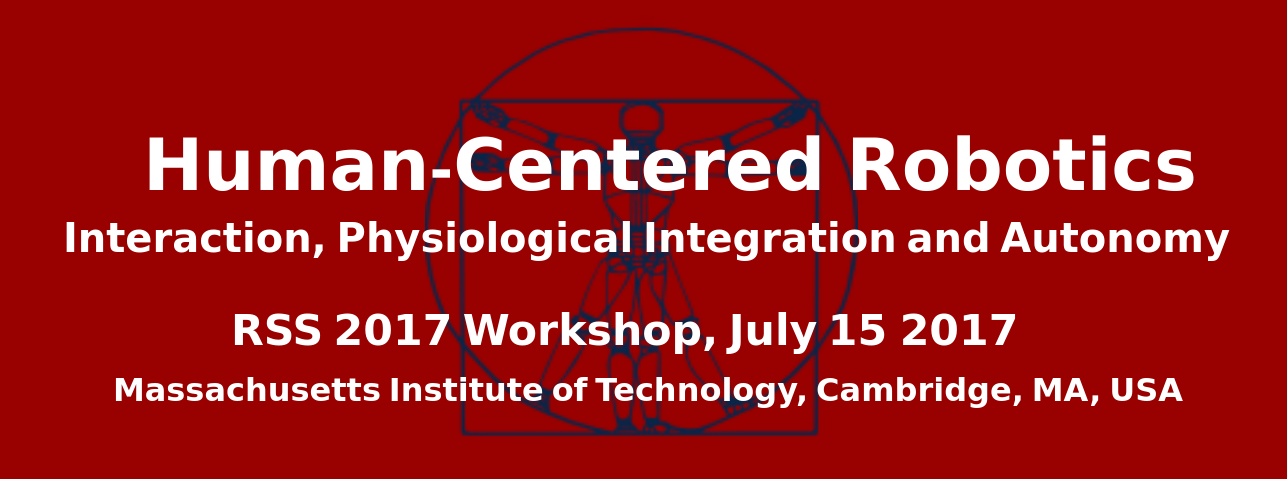
Human-centered robotics focuses on the science and systems needed for robots to interact, assist and cooperate with humans. It is a multifaceted and challenging domain which entails robot operation in human environments and close interaction with non-professional users. The workshop aim is to tackle this topic from multiple perspectives: (i) physical and social interaction with humans; (ii) physiological integration with the human body; and (iii) autonomy in dynamic and uncertain environments. There also will be a focus on assessment tools from each of these disciplines, with the hope of beginning to synthesize assessment standards for human-centered robotics that draw from each. The intended audience includes researchers from areas spanning human-robot interaction, assistive and rehabilitation robotics, robotic systems design, field robotics, wearable robotics, biomedical and clinical domains. The workshop will foster multidisciplinary discussion and a consolidation of perspectives, methodologies and assessment tools---to align and benefit research efforts in human-centered robotics. The program includes distinguished invited talks, a panel discussion and a poster session. Venue: MIT Building 36 room 155
Call for contributions
We invite submissions that are relevant to the workshop topics in the form of extended abstracts (2 to 4 pages). Papers should be submitted via email to hcr at u.northwestern.edu as PDF files using the RSS formatting guidelines. The review process will be single-blind and submissions do not need to be anonymized. Accepted papers will be presented in a poster session in the workshop program and will also be published on the workshop website.
Anywhere on Earth Time
Paper submission deadline: June 2, 2017 [*extended*] Acceptance notification: June 20, 2017 Camera ready submission: July 5, 2017 Workshop: July 15, 2017
Potential topics include, but are not limited to:
- Physical and social interaction among robots and humans
- User-centered design models and approaches
- Shared control approaches and challenges
- Wearable robotics systems for rehabilitation and human augmentation
- Autonomy for human environments
- Safety-compliant robot systems
- Performance metrics and benchmarking
- Bidirectional adaptation and learning
- Applications and challenges in human-centered robotics (e.g. to augment function, rehabilitation, social interaction/therapy, to provide assistance)
Workshop Organizers

Siddarth Jain is a Computer Science Ph.D. candidate in the McCormick School of Engineering at Northwestern University. He is working in the assistive & rehabilitation robotics laboratory (argallab) at the Rehabilitation Institute of Chicago (RIC). He is interested in the application of artificial intelligence, computer vision and machine learning methods to benefit human-centered robotics and assistive technologies. His current research involves designing and investigating semi-autonomy behaviors and adaptive assistance in shared control to facilitate operation of assistive machines for users with unique needs and preferences.

Brenna Argall is an Assistant Professor of Rehabilitation Robotics at Northwestern University, and a Research Scientist at the Rehabilitation Institute of Chicago, where she founded and directs the assistive & rehabilitation robotics laboratory (argallab). The argallab strives to advance human ability by leveraging robotics autonomy---to ease the burden of controlling assistive machines. Brenna is recipient of the NSF Early Faculty CAREER Award, and was named one of the 40 under 40 by Crain's Chicago Business.

Elliott Rouse is the Director of the Neurobionics Lab in the Center for Bionic Medicine at the Rehabilitation Institute of Chicago and is an Assistant Professor in the Department of Physical Medicine amp; Rehabilitation, as well as the Departments of Mechanical and Biomedical Engineering at Northwestern University. The vision of the Neurobionics Lab is to discover the fundamental science that underlies human joint dynamics during locomotion and incorporate these discoveries in a new class of wearable robotic technologies. The Lab uses technical tools from mechanical and biomedical engineering applied to the complex challenges of human augmentation, physical medicine, rehabilitation and neuroscience. Dr. Rouse and his research have been featured at TED, on the Discovery Channel, CNN, National Public Radio, Wired Magazine UK, Business Insider, and Odyssey Magazine.

Andrea Thomaz is an Associate Professor of Electrical and Computer Engineering at The University of Texas at Austin. Prof. Thomaz joined Texas ECE in January 2016 after serving as an Associate Professor of Interactive Computing at the Georgia Institute of Technology from 2007-2016. Her research aims to computationally model mechanisms of human social learning in order to build social robots and other machines that are intuitive for everyday people to teach. Prof. Thomaz received an NSF CAREER award in 2010 and an Office of Naval Research Young Investigator Award in 2008.

Dave Ferguson is a Co-founder of Nuro. Previously, he served as the principal lead in computer vision and machine learning for Google's self-driving car program from 2011-2016. From 2006-2008 Dave was senior research scientist at Intel Research, Pittsburgh. He received his BSc (Hons) degree in Maths and Computer Science from Otago University in 2001, and his Ph.D. in Robotics from Carnegie Mellon University in 2006. His algorithms have been used by a number of real-world robotic systems including the Mars Rovers.
© 2017.